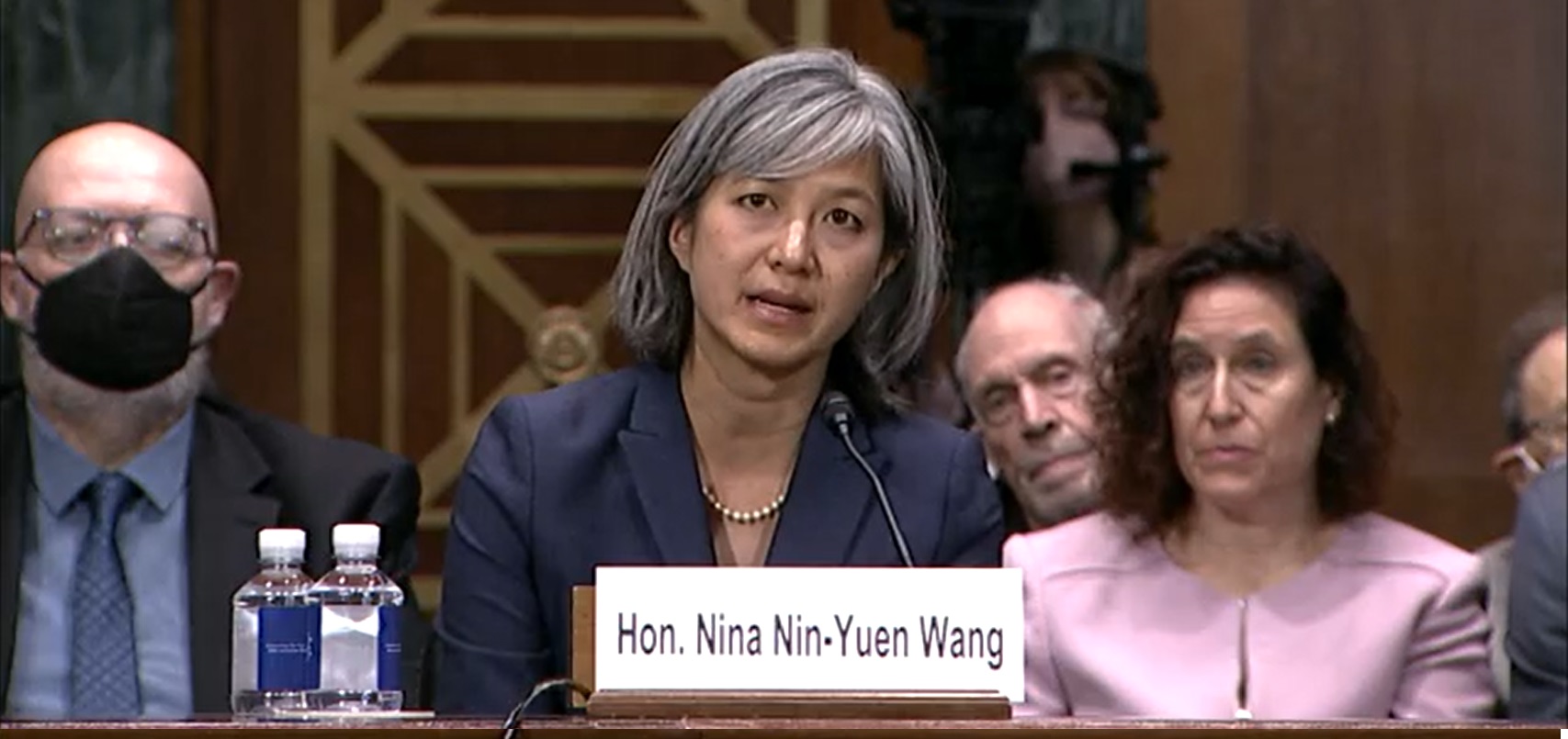‘An American success story’: Nina Wang formally sworn in as history-making federal judge

Colorado’s newest federal judge, Nina Y. Wang, has a quote taped on her courtroom bench from the memoir of American lawyer and social justice advocate Bryan Stevenson.
“I’ve come to believe that the true measure of our commitment to justice, the character of our society, our commitment to the rule of law, fairness, and equality cannot be measured by how we treat the rich, the powerful, the privileged, and the respected among us,” the excerpt reads. “The true measure of our character is how we treat the poor, the disfavored, the accused, the incarcerated, and the condemned.”
Speaking to a room of friends, family and supporters in downtown Denver on Friday, Wang struck a humble tone in alluding to her own duty to the accused and incarcerated.
“I have and will continue to fall short. But the one thing I can assure you is that I will put my best into it,” she said.
President Joe Biden nominated Wang in January for a seat on Colorado’s seven-member federal trial court to succeed Christine M. Arguello, a George W. Bush appointee. At the time, Wang had been a magistrate judge on the court for seven years, and is the first magistrate judge in Colorado to ever receive a lifetime appointment as a district judge.
Magistrate judges are hired by the court and tend to focus on preliminary or administrative matters in cases. However, they are able to handle nearly all the duties of their presidentially-appointed counterparts, and Wang came into her current job with a lengthy résumé of presiding over trials, issuing decisions and hearing cases.
In July, Wang received an informal swearing-in following her U.S. Senate confirmation. Friday’s gathering at the Alfred A. Arraj U.S. Courthouse was the formal ceremony for Wang’s oath of office, known as an investiture.
“These investitures rarely make headlines or lead the cable television at night. Most Americans, I hate to break it to you, have no idea what an investiture is or what a district court judge does for that matter,” said U.S. Sen. Michael Bennet. However, he added, “It’s my belief that recommending and confirming federal judges is one of the Senate’s most important responsibilities.”
Bennet and U.S. Sen. John Hickenlooper, with an advisory committee assisting them, were responsible for screening applicants and recommending finalists for federal judicial vacancies arising in Colorado during Biden’s first two years in office. To date, the administration has appointed four judges – all women – to the trial and appellate courts based in Denver.
The investiture briefly celebrated that progress. U.S. District Court Chief Judge Philip A. Brimmer thanked the senators for ensuring Colorado’s nominees moved through the evenly-divided Senate in a timely fashion.
“With a Senate that was 50-50, obviously it’s a difficult environment to navigate,” he observed to Bennet.
Hickenlooper appeared briefly through a recorded video to congratulate Wang. He noted she was part of a large class of women and attorneys of color who Biden has nominated since taking office, adding, “We’re one step closer to our federal courts reflecting America.”

Wang was born in Taiwan and her family immigrated to the United States when she was two years old. When immigration authorities lost the family’s application for permanent residency, U.S. Sen. Robert Dole, R-Kan., stepped in to help, and the experience contributed to Wang’s interest in the legal profession.
“Judge Wang is really an American success story,” Brimmer said.
Following her graduation from Harvard Law School, Wang joined the civil division of the U.S. attorney’s office in Colorado, working under her now-colleague, U.S. District Court Judge Regina M. Rodriguez.
From 2004 until her appointment as a magistrate judge in 2015, Wang worked at the international law firm Faegre Drinker, where she focused on intellectual property and patent litigation.
Natalie Hanlon Leh, the No. 2 official in the Colorado Attorney General’s Office, spoke about her earlier work and friendship with Wang. Hanlon Leh described Wang as someone who cares about the quality of her work and who wants openness and fairness in the courts. The art inside Wang’s chambers, Hanlon Leh said, includes the famous photograph of a lone man standing in front of a tank in Beijing’s Tiananmen Square, plus a women’s suffrage poster.
“Nina describes the theme of this art as ordinary people doing extraordinary things in the name of justice for all,” Hanlon Leh said. “And that sounds a lot to me like Nina.”
Hanlon Leh also revealed the lighter side of her friend, who is “equally interested in food and getting her steps in every day.” She recalled one occasion when Wang was “fired” by a client in private practice.
“It wasn’t because she didn’t do good work. She did amazing work,” Hanlon Leh said. “The CEO of this corporation used numerology to make litigation decisions. And when Nina took over as lead counsel, the numerologist determined that her birthdate did not align with the numerology of the case number, the filing date or the corporation’s ‘birthdate.'”
Wang instead helped the client find a new lawyer, “with a birthdate acceptable to the numerologist.”
Following her oath of office, Wang thanked people in attendance from every phase of her professional life, her church friends and everyone involved in operating the courthouse – from the judges to the janitorial staff. She also had kind words for her competitor on the nomination shortlist, lawyer Kenzo Kawanabe.
In addition to the judges and magistrate judges of the U.S. District Court, the dignitaries included: Chief Judge Jerome A. Holmes of the U.S. Court of Appeals for the 10th Circuit, along with Judges Timothy M. Tymkovich, Allison H. Eid and Veronica S. Rossman; Colorado Supreme Court Justices Monica M. Márquez, William W. Hood III, Richard L. Gabriel and Melissa Hart; Cole Finegan, the U.S. Attorney for Colorado; Federal Public Defender Virginia Grady; Attorney General Phil Weiser; and John Suthers, a former attorney general and U.S. attorney who is currently the mayor of Colorado Springs.
Following the investiture was a reception at the 10th Circuit’s courthouse. An inquiry to Wang’s chambers about the source of funding for the reception did not receive a response.














